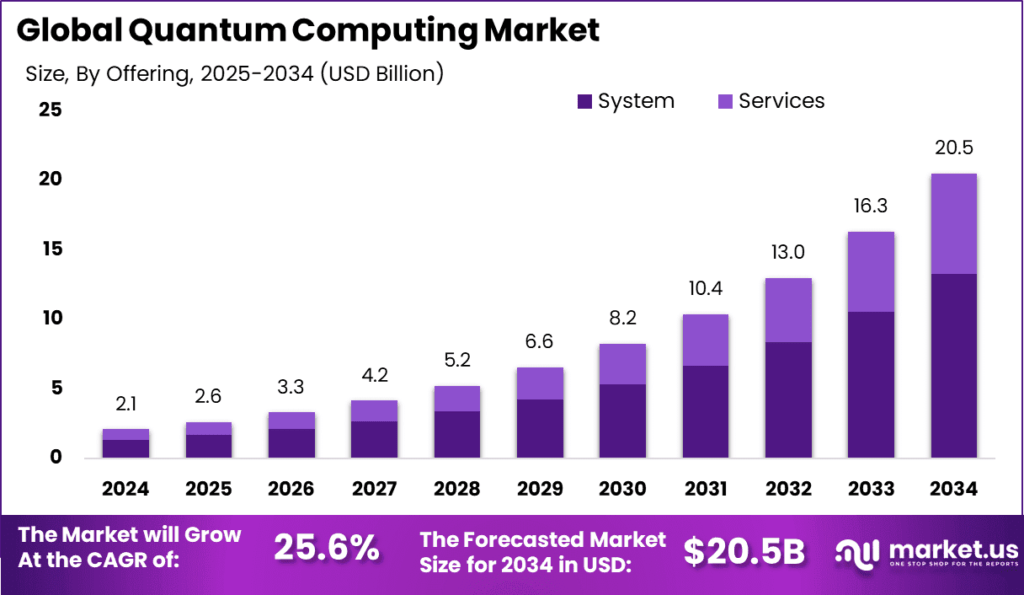The global quantum computing market is undergoing a period of transformative growth, backed by rising public and private investments, significant advancements in quantum hardware, and the emergence of cloud-based access models. According to Market.us, the market is projected to reach approximately USD 20.5 billion by 2033, up from USD 2.1 billion in 2024, reflecting a strong compound annual growth rate of 25.6%.
This surge is being largely driven by increasing interest in quantum-enabled applications such as cryptography, simulation, optimization, and advanced modeling. North America dominated the landscape in 2024, holding a commanding 37.6% share, with revenue estimated at USD 0.7 billion, supported by robust R&D infrastructure, favorable government backing, and deep engagement from the tech industry.

A clear shift is visible in the deployment and delivery model of quantum technologies. The System-based segment led in terms of offerings, capturing 64.6% of the total market share in 2024, owing to the growing demand for dedicated quantum processors and on-premise deployment models. Furthermore, organizations continue to prioritize data control and security, which is evident in the On-Premises segment’s dominant 60.2% share.
Within application segments, Optimization emerged as the leading area, accounting for 40.5%, primarily driven by real-world use in logistics, financial modeling, and resource scheduling. Among end-users, the Aerospace & Defense sector held the highest share at 32.6%, demonstrating strong interest in quantum capabilities for simulation and mission-critical computing.
The quantum computing ecosystem is rapidly evolving, with early-stage adoption led by sectors handling high-dimensional data and requiring real-time computation. The finance industry is increasingly deploying quantum models in 28% of its operations, with a clear focus on portfolio optimization and fraud detection.
Meanwhile, the energy and materials sector contributes to 16% of current applications, leveraging quantum systems for material discovery and power grid optimization. This adoption is also reinforced by government initiatives globally. Notably, India’s National Quantum Mission, backed by ₹6,003.65 crore (approximately USD 730 million), highlights a strategic intent to advance national capabilities in quantum computing and sensing technologies.
Emerging technologies are significantly enhancing the accessibility and practical utility of quantum systems. The rise of Quantum Computing as a Service (QCaaS) is helping enterprises circumvent the high capital cost of quantum infrastructure by offering cloud-based access.
Simultaneously, hybrid quantum-classical systems are bridging the gap between theoretical potential and real-world applications. Recent hardware innovations, such as Amazon’s Ocelot chip utilizing cat qubits for improved error suppression, are addressing major challenges related to system stability and computational accuracy.
Several real-world use cases are now actively validating quantum computing’s commercial promise. In drug discovery, molecular simulations are accelerating pharmaceutical innovation by drastically reducing the time required to analyze chemical interactions. In logistics and manufacturing, companies are using quantum algorithms to optimize operations and lower resource consumption.
Financial institutions are improving risk analysis through quantum-enhanced models, and in cybersecurity, technologies like Quantum Key Distribution (QKD) are advancing toward unbreakable encryption. Additionally, sectors such as climate science, materials engineering, and autonomous transportation are experimenting with quantum frameworks to solve long-standing bottlenecks in modeling and simulation.
Key developments across the industry are further shaping the competitive landscape. In February 2024, D-Wave made its 1,200+ qubit Advantage2 prototype available on its Leap quantum cloud platform, marking a strategic step in democratizing access to advanced quantum hardware.
In November 2023, Terra Quantum and NVIDIA entered into a partnership to jointly develop hybrid quantum applications, aligning classical high-performance computing with quantum algorithms. Such collaborations reflect a shift toward mainstream readiness and integration of quantum resources into commercial and industrial processes.
Looking ahead, attractive investment opportunities exist in areas such as healthcare, artificial intelligence, and precision manufacturing, where quantum tools can process enormous datasets and deliver new levels of accuracy and speed. As venture capital interest continues to rise – with USD 2.1 billion invested into quantum startups in 2024 – the industry is seeing both established tech giants and deep-tech innovators race to bring viable solutions to market. Leading players such as IBM, Microsoft, Google Quantum AI, D-Wave, and Zapata Computing are laying the foundation for future breakthroughs.
In conclusion, quantum computing is transitioning from theoretical promise to practical reality. The foundational capabilities of qubits, superposition, and entanglement are enabling new computation paradigms, particularly in domains previously limited by classical computing constraints. While challenges persist in areas such as error correction, scalability, and quantum workforce availability, steady progress across hardware, software, and cloud accessibility is building confidence. As regulatory frameworks begin to form and use cases become more commercially viable, quantum computing is set to emerge as a critical pillar of innovation across science, industry, and national infrastructure.
Discover More @ https://market.us/report/quantum-computing-market/
Key Market Segments
By Offering
- System
- Services
By Deployment
- On-Premises
- Cloud
By Application
- Optimization
- Simulation
- Machine Learning
- Others
By End-user
- Aerospace & Defense
- BFSI
- Healthcare
- Automotive
- Energy & Power
- Chemical
- Government
- Others
some of the most prominent quantum computing industry players.
- IBM Corporation
- Google Quantum AI
- Microsoft Corporation
- Amazon Web Services, Inc
- Atos Quantum
- D-Wave Quantum Inc.
- Intel
- Hitachi
- QC Ware
- Zapata Computing
- Toshiba Corporation
- Other Key Players
The macro analyst desk brings highly sought after financial news based on market analysis, insider news and company filings.
